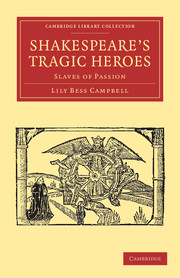CHAPTER TWO
The Value of Imitation in Teaching. Drama as Teaching by Imitation.
Published online by Cambridge University Press: 07 September 2010
Summary
The theory of the drama in England during the Renaissance was largely the result of the engrafting of the rediscovered classical doctrine of imitation upon this tradition continued from the Middle Ages of teaching by exempla. It is my purpose, therefore, to trace the form which this theory gradually assumed as the result of the fusion of the tradition of tragedies as exempla and of dramatic poetry as imitation. The resulting theory is that which was concerned with dramatic tragedies, and is therefore the theory which is concerned with justifying, in a commonwealth where Puritan ideas were flourishing, the existence of tragedies and comedies presented as stage plays.
More often than is generally realized the Renaissance discussion of poetry and drama as imitation took its point of departure from the third book of Plato's Republic, where there was rather confusingly discussed the question of admitting tragedies and comedies into the ideal state. The one point about which there could be no confusion was that this discussion was concerned with tragedies and comedies as forms of imitation.
Aristotle's treatment of imitation in the Poetics also gave texts to the more learned critics. The critics were, of course, concerned with the endlessly quoted definition of tragedy as “an imitation of an action that is complete in itself, as a whole of some magnitude”. But they were also concerned with the fact that Aristotle pointed out that “imitation is natural to man from childhood”, and, furthermore, that “it is also natural for all to delight in works of imitation”.
- Type
- Chapter
- Information
- Shakespeare's Tragic HeroesSlaves of Passion, pp. 25 - 38Publisher: Cambridge University PressPrint publication year: 2009First published in: 1930

